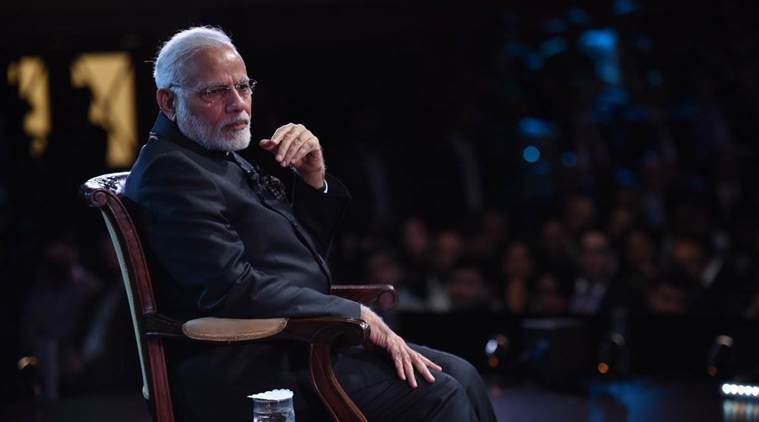 PM Modi, when asked about the surgical strikes by a member of the audience, said that India had first informed Pakistan about the strikes and then the media in India. (Source: PIB/Twitter)
PM Modi, when asked about the surgical strikes by a member of the audience, said that India had first informed Pakistan about the strikes and then the media in India. (Source: PIB/Twitter)
Prime Minister Narendra Modi said on Wednesday that Pakistan’s generals were scared to come on the phone when India wanted to inform them about the “surgical strikes” across the Line of Control on September 29, 2016.
At an event organised at the Central Hall Westminster in downtown London and moderated by lyricist and Central Board of Film Certification chairman Prasoon Joshi, Modi, when asked about the surgical strikes by a member of the audience, said that India had first informed Pakistan about the strikes and then the media in India.
“I said before India gets to know, we should call Pakistan and tell them what we did so they can come and take their bodies if they have time. We were calling them since 11 am but they were scared to come on phone, at 12 (noon) we spoke to them and then told the Indian media,” he told the gathering to a round of applause.
“Yeh Modi hai…usi bhasha mein jawab dena jaanta hai (This is Modi…he knows how to reply in the same language)”, he said, several times invoking himself in the third person as he reiterated that India would not tolerate those who export terror.
“Those who like exporting terror, I want to tell them that India has changed and their antics will not be tolerated…We believe in peace. But we will not tolerate those who like to export terror. We will give back strong answers and in the language they understand. Terrorism will never be accepted,” he said.
Entering the last year of his term, Prime Minister Modi’s “Bharat ki baat, sabke saath” event was different than the one at Wembley Stadium of November 2015 or the Madison Square Garden in New York (US) of September 2014.
While hope and change were the key themes in those events, this time he also talked about how he was dealing with “impatience” among Indian voters. He claimed that people were asking for more because they trusted his government and knew that he could deliver. And that any mistakes — if any — that were committed were not in bad faith.
“I assure the citizens that I might make mistakes but will never do anything with a wrong intention,” he said.
Unlike the earlier diaspora events where he spoke about what he planned to do, this time Joshi’s questions provided him a platform to showcase his four years with a Q and A which was interspersed with videos featuring men and women from across the country praising the government’s initiatives.
Modi said that “criticism” should be rewarded and is a “gold mine” but allegations should be avoided. “Criticism has unfortunately taken shape of allegations. Criticism should be rewarded and allegations discouraged.”
“Many people say that because Modi doesn’t want to give answers, so he has done a stage-managed show,” he told the gathering as he broke about himself into third person several times during the more than two-hour orchestrated event. At one point, he also said, “Modi doesn’t hanker for a place in history.”
When he was asked about the growing impatience among the Indian public, he said, “Impatience is not a bad thing. If a person has a cycle, a person then aspires for a scooter. If a person has a scooter, person aspires for a four-wheeler. It is natural to aspire. India is getting increasingly aspirational…People have more expectations from us because they know that we can deliver. People know that when they say something, the Government will listen and do it.”
In the more than two-hour event, promoted and streamed on Narendra Modi app live, he reiterated the “onus on sons” and “not daughters” about the “sin” of rape recalling his first Independence Day address as PM.
Interestingly, British PM Theresa May did not hold the customary joint press conference with Modi after their bilateral meeting unlike former PM David Cameron in November 2015.